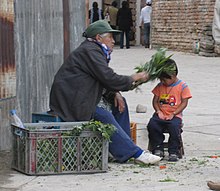Curandero

Un curandero (curandera au féminin) est un guérisseur en Amérique hispanique. Ils administrent des remèdes pour les maladies. Leurs pouvoirs sont considérés comme surnaturels dans la mesure où la croyance populaire dit qu’ils traitent directement avec des esprits malveillants à l’origine des maladies.
Les différents types de curanderos sont les « yerberos » qui utilisent principalement les herbes (ceux qui n’utilisent que le tabac sont appelés « tabaqueros », ceux qui utilisent l’ayahuasca sont des ayahuasqueros, le peyote, les peyoteros, etc.), les « oracionistas » qui pratiquent la prière, les « parteras » qui pratiquent les accouchements[1],[2],[3],[4],[5],[6],[7].
Références[modifier | modifier le code]
- (en) "Religious features of curanderismo training and practice" Explore: The Journal of Science and Healing,2013 May-Jun;9(3):150-8. doi: 10.1016/j.explore.2013.02.003. https://www.ncbi.nlm.nih.gov/pubmed/23643370
- (en) "Folk Medicine and Traditional Healing," National Center for Farmworker Health, Inc. August 2011 http://www.ncfh.org/
- (en) Journal of Immigrant Health, Vol.7, No.1, January 2005; DOI: 10.1007/s10903-005-1387-8
- (en) "The Use of Curanderismo in a public health care system" Archives of Internal Medicine, 2001 May 28;161(10):1336-40. https://www.ncbi.nlm.nih.gov/pubmed/11371263
- (en) "Pushing the envelope for cultural appropriateness: does evidence support cultural tailoring in type 2 diabetes interventions for Mexican American adults?"The Diabetes Educator, 2011 Mar-Apr;37(2):227-38. doi: 10.1177/0145721710395329. Epub 2011 Feb 22. https://www.ncbi.nlm.nih.gov/pubmed/21343599
- (en) "The role of spirituality healing with perceptions of the medical encounter among Latinos," Reyes-Ortiz, Rodriguez & Markides, Journal of General Internal Medicine, 2009 Nov;24 Suppl 3:542-7. doi: 10.1007/s11606-009-1067-9. https://www.ncbi.nlm.nih.gov/pubmed/19842004
- (en) "Hispanic ethnicity, language, and depression: physician-patient communication and patient use of alternative treatments," International Journal of Psychiatry in Medicine, 2004;34(3):235-46 https://www.ncbi.nlm.nih.gov/pubmed/15666958
